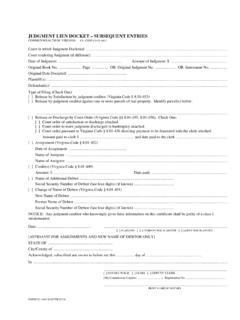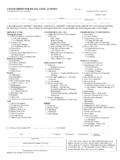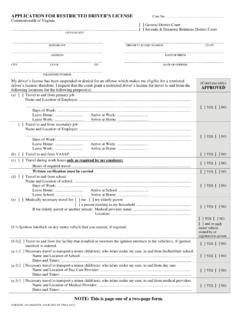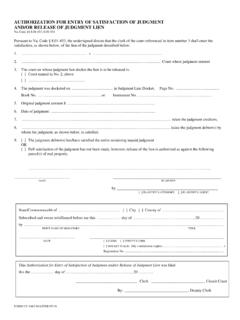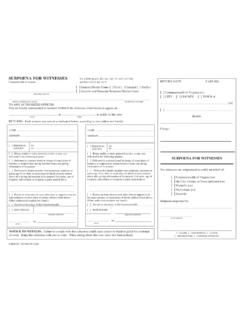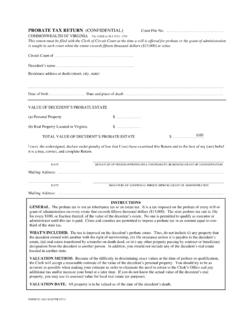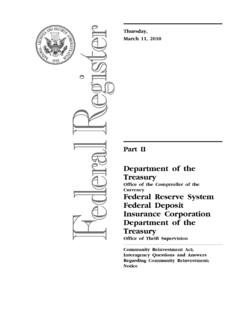Transcription of CHAPTER 6 CASE PROCEDURES - Judiciary of Virginia
1 GENERAL DISTRICT COURT MANUAL CIVIL CASE PROCEDURES PAGE 6-1 Office of the Executive Secretary Department of Judicial Services Rev: 7/17 CHAPTER 6 - CIVIL CASE PROCEDURES I. INTRODUCTION Civil cases are brought to enforce, redress, or protect the private rights of an individual, organization or government entity. The remedies available in a civil action include the recovery of money damages and the issuance of a court order requiring a party to the suit to complete an agreement or to refrain from some activity. The party who initiates the suit is the plaintiff, and the party against whom the suit is brought is the defendant.
2 In civil cases, the plaintiff must prove his case by a preponderance of the evidence. The following subsections provide a quick summary of the jurisdiction and venue requirements and the available discovery PROCEDURES in general district court. A. Jurisdiction Va. Code The general district court has exclusive original jurisdiction over any claim not exceeding $4,500, excluding interest and attorney s fees. The general district court has concurrent jurisdiction with the circuit court over any claim in excess of $4,500 and up to and including $25,000, excluding interest and attorney s fees claimed.
3 However, claims, counter-claims, and cross-claims filed in actions for unlawful entry or detainer are not subject to the maximum jurisdictional limit $25,000 applicable in general district court regardless of the purpose for which the occupant is using the premises. (Commercial and residential) Civil cases involving amounts greater than $25,000 are within the exclusive jurisdiction of the circuit courts. The general civil jurisdiction statute for general district courts sets forth additional situations in which district courts have jurisdiction, whether it is exclusive or concurrent with the circuit courts.
4 Va. Code A court must have jurisdiction over the parties and the action in order to hear the case. B. Venue Venue refers to the place of trial, the particular county or city in which a case must be heard. See Va. Code and Virginia Code (preferred venue) and Va. Code (permissible venue), list several different types of actions and the places in which venue would be proper for each action. In order for venue to be proper, it must be in accordance with these sections. Va. Code GENERAL DISTRICT COURT MANUAL CIVIL CASE PROCEDURES PAGE 6-2 Office of the Executive Secretary Department of Judicial Services Rev: 7/17 A defendant may object to the choice of venue, but it is within the court s discretion whether or not to grant the request for a venue transfer.
5 Va. Code ; , and Further, an objection to improper venue does not result in a dismissal, but in a transfer of the action to a proper venue. Va. Code C. Discovery PROCEDURES Discovery PROCEDURES in the general district courts are limited to the following: Subpoena duces tecum, to parties and non-parties. Va. Code Evidence of medical reports or records; testimony of health care provider or custodian of records. Va. Code Bill of particulars (filed by plaintiff at judge s request). Va. Code :1. Grounds of defense (filed by defendant at judge s request). Rule 7B:2. Interrogatories (following issuance of a fieri facias upon a judgment rendered in general district court).
6 Va. Code II. NARRATIVE DESCRIPTION A plaintiff initiates a civil case in the general district court by filing a pleading describing the complaint or dispute with the defendant named in the pleading and remitting all appropriate fees. Va. Code , :2, , , and All pleadings, motions, briefs and other documents filed in the court shall be on paper eight and one-half by eleven inches in size, with certain exceptions for evidentiary items. See Rule 7A:7. Whenever a party files, or causes to be filed, with the court a motion, pleading, subpoena, exhibit, or other document containing a social security number or other identification number appearing on a driver's license, credit card, debit card, bank account, or other electronic billing and payment system, the party shall make reasonable efforts to redact all but the last four digits of the identification number, unless there is a specific statute to the contrary that applies to the particular type of proceeding in which the party is involved.
7 Va. Code There are two types of pleadings in general district court: the civil warrant or summons form and the motion for judgment. Va. Code , The more frequently used of the two is the civil warrant or summons form, which the plaintiff files, with the appropriate filing fee in the clerk s office or with a magistrate. If the warrant or summons form is filed in the clerk s office, the clerk marks the date and time of receipt in the clerk s office on the form, issues receipts for fees, assigns the case a sequential case number which is placed on the form, and indexes the case in the case index system.
8 Va. Code If the civil warrant or summons form and fees are filed with a magistrate, the magistrate forwards all forms and fees to the clerk s office that performs the above listed process. When any pleading in any civil action is filed in a district court, GENERAL DISTRICT COURT MANUAL CIVIL CASE PROCEDURES PAGE 6-3 Office of the Executive Secretary Department of Judicial Services Rev: 7/17 including interrogatories and garnishments, the clerk or his designee shall stamp or mark the date received and time of filing on the face of such pleading. Filing results in the issuance of process, such as a district court form DC-412, WARRANT IN DEBT prepared by either the clerk s office or the magistrate and picked up for service by the sheriff.
9 After serving the civil warrant or summons, the sheriff returns the original civil warrant or summons together with the return of service to the clerk s office. The other type of pleading is a motion for judgment or complaint prepared entirely by the plaintiff or plaintiff s attorney, (or, if a business entity is a party, certain high-level employees) who files it with the appropriate filing fee in the clerk s office. The clerk then marks the date and time of receipt in the clerk s office on the motion for judgment, assigns a sequential case number which is placed on the motion for judgment, and indexes the case in the index system.
10 The sheriff picks it up and serves it like a civil warrant and makes his return of service on the original, which is returned to the clerk s office. Va. Code The defendant may file an answer with the court, settle the suit prior to court appearance, or appear in court on the return date and, depending on local practice, be ready for trial or be ready to set a trial date. Parties not represented by counsel, and who have made an appearance in the case, shall promptly notify in writing the clerk of court wherein the litigation is pending, and any adverse party, of any change in the party s address necessary for accurate mailing or service of any pleadings or notices.
